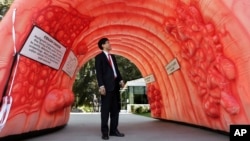Although cancer is one of the leading causes of death worldwide, colorectal cancer is one of the cancers that we can actually prevent, the World Health Organization says.
The colon is a long, muscular tube that’s also known as the large intestine. It is part of the digestive system. Colon cancer is linked to diet, genetic predisposition and age. In the U.S., 1 in 23 people will be told they have colon cancer.
WATCH: Colon Cancer Can be Prevented and Treated
Michele Alexander got her diagnosis at age 53.
“How much longer do I have? My daughter’s 24. You know, she’s still got a lot of life left. How much longer will I be with her? Those kind of thoughts go through your head,” Alexander said.
Largely preventable
Dr. Zihao Wu at the University of Missouri Health Care says this type of cancer is largely preventable.
“The majority of colon cancer develops from a benign polyp, and that takes about 10 to 15 years,” he said. “And if you find a polyp and remove it, you won’t have colon cancer, so it’s very important to have a screening to prevent cancer.”
As scary as her diagnosis was, Alexander’s passion for auto racing helped her get through her ordeal. Her favorite driver is Carl Edwards, and she had tickets to a race in which he was competing. When someone shared her story with him, he called her.
“I said, ‘I know there’s an auction where I can bid to ride in the truck with you for driver intros, and it is my goal to win that auction,’” she said. … He said, ‘Don’t bid. You get here, you’re riding with me.’”
Six weeks after surgery to remove the cancer in her colon, Alexander got her ride.
“Oh, it was just joy. In a race for my life, and I crossed the finish line a winner,” she said.
Healthy lifestyle helps
Wu said Alexander’s attitude helped.
“She wanted to get better. She had a strong will to get better, and I think that’s very important,” he said.
Doctors say you can help prevent colon cancer if you eat plenty of greens, whole grains and vegetables and legumes, which are high in fiber. Regular exercise also helps, and if you smoke, stop.
Most importantly, get a regular screening starting at age 50 or sooner if you have a family history.
If colon cancer is diagnosed at an early stage, the World Health Organization says 90 percent of patients survive at least five years, compared with no more than percent of those diagnosed at an advanced stage.
Two years after her surgery, Alexander is still cancer free and still a racecar enthusiast.
